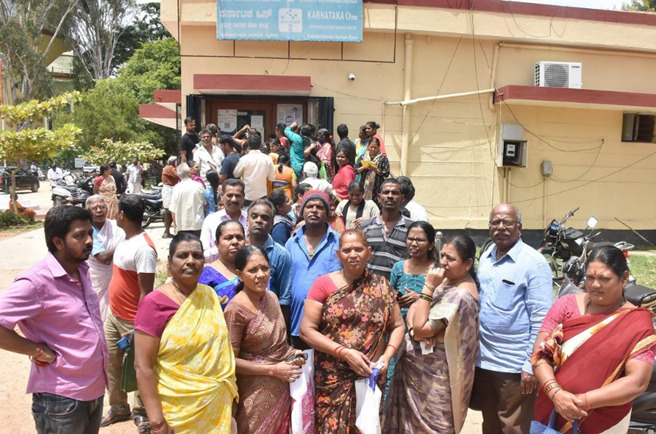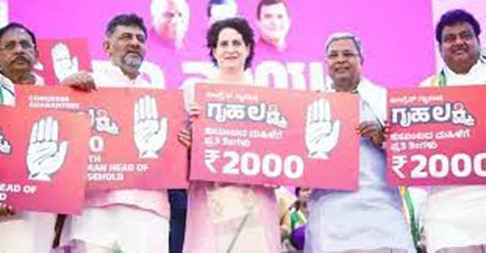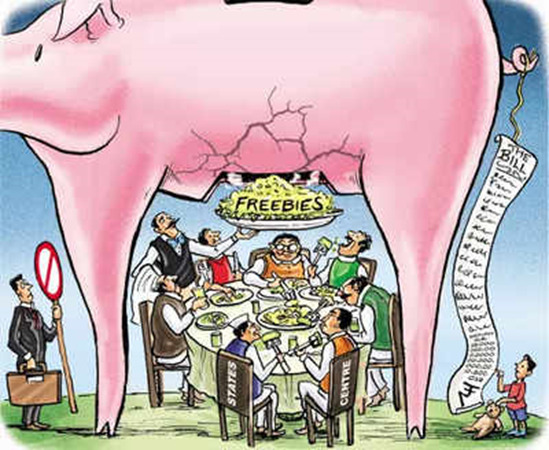The Congress ruled government in Karnataka rolled out the Gruha Lakshmi Scheme on 30th August 2024 which provides for direct benefit transfer of 2000 rupees into the accounts of female heads of households which are below poverty line.

What is the Gruha Lakshmi Scheme?
The scheme was introduced in the election manifesto of the Congress party in the 2024 State Elections. Fulfilling its promise, the government has allocated 32000 crores for this scheme. It has promised financial inclusion and empowerment of women by DBT of 2000 rupees every month.
The female heads of BPL families who are listed so under Antodaya, BPL and APL are eligible for the scheme. It is expected to provide financial help to 1.1 lakh women in the state.
Women have to produce either their Aadhar card linked bank account, Aadhar linked phone number or bank details or their passbook. Registration for the scheme is available offline and online.
Social Implications of Gruha Lakshmi

The objectives of the scheme create a promising narrative for its implication. It aims to provide financial autonomy to the women of poor households in turn empowering them to fulfill their individual needs.
However, it becomes important to question the viability of the argument. While it is true that financial independence does empower women to be able to take decisions for themselves but this argument is assumptive as it believes that these women are aware of “their” needs and have the necessary freedom to spend the money given to them.
It is important to acknowledge that the women who come from low social and economic backgrounds are socialised into believing that their role and purpose is to serve the members of their household, depriving them any scope of individuality. Illiteracy makes these women susceptible to such false beliefs. For households which are violent and oppressive in nature, such transfers reduce women to mere mechanisms of additional income for their co-habitants. In addition, it de-incentivises long term mobility options such as SHG formations or skill development. However, there is no denying that there may be exceptions.
As per the Census of 2011, the literacy rate of females in Karnataka stood at 68.08%. The state has approximately 1.2 crore BPL card holders which is almost 72% of the state’s population.
According to an economic expert, the state budget of Karnataka has a revenue deficit of approximately 14,699 crores. Implementation of the Gruha Lakshmi scheme demands reduction from capital expenditure of almost 65% or an increase of 67% in revenue deficit.
The data mentioned above highlights the fiscal burden that the scheme puts on the budget of the government. Long term economic goals are hampered and those in search for skill development and employment are denied of such opportunities. Economic and social development gets floundered and mobility gets stagnated.
A case in hand is the sudden shortage of labourers in the Karnataka coffee plantations due to grant of freebies. While such schemes do not pay enough to fulfil fiscal responsibilities of providing education to children or indulge in skill development, they provide enough to live a life of mere subsistence. This is not to suggest that the labour sector is devoid of exploitative practices. However, these funds could have been instead utilised to raise daily wages or develop such informal sectors.
The Way Forward

Schemes that provide freebies not only worsen the fiscal health of the state but also have an opportunity cost for the various social empowerment programmes in other domains. The budget allocations of Karnataka for education and health remain far below than allocation in freebies.
While freebies do increase public satisfaction and create trustworthy relationship between the public and the state while providing for short term socio-economic benefits, it creates a system if dependency. This has long term consequences on development and mobility. It also creates a divide between the poor and the rich.
Thus, it is important to dis-empower the freebie culture of populist politics and instead facilitate a culture of inclusive development by raising voter awareness among voters, incentivising initiative among families of poorer households by creating job opportunities for them, providing scholarships and promote skill development. The women must be organised into cooperative bodies and self help groups and allocation must be done for their training for the same.
The upper echelons of the society must be incentivised to create space for those below and an integrative societal approach must be brought to facilitate growth and development.












